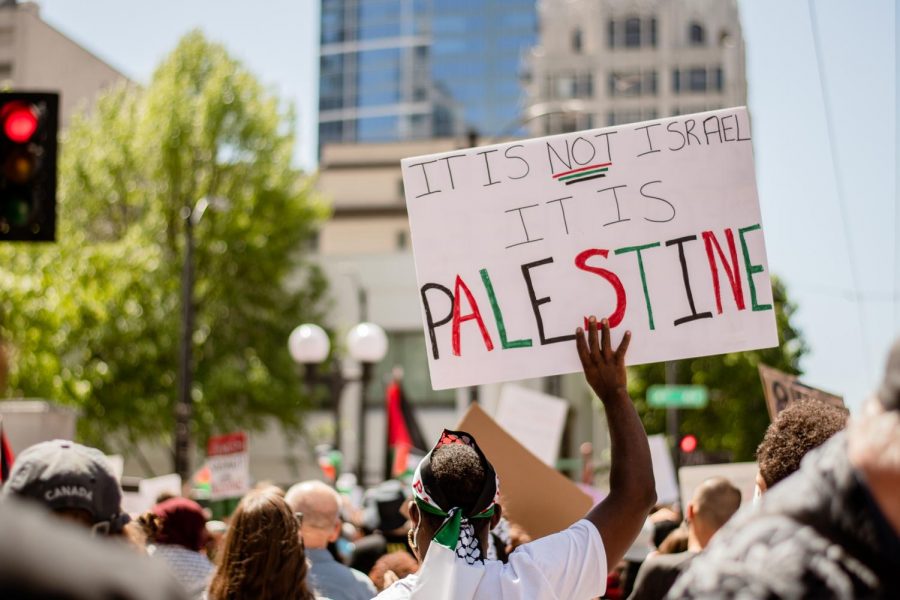Seattle U Community Responds to War in Gaza
As a ceasefire holds between Israelis and Palestinians in the Gaza Strip, many around the world are left with familiar emotions of sorrow and frustration. These feelings resurface every few months or years when the decades-long conflict between Israel and the occupied Palestinian territories make headlines, but for those Seattle U students whose connections run deeper, these feelings are more constant.
Onur Bakiner, a professor in the Political Science department at Seattle University provided some background for why violence erupted for 11 days between the two parties.
“This round of the conflict started when the Supreme Court of Israel announced that it was going to make a decision on six palestinian families that were being removed from an East Jerusalem neighborhood, so there were protests,” Bakiner said. “The Israeli government closed down one of the entrances to the Al Aqsa mosque, which further inflamed the protests in East Jerusalem”
These inflamed protests led to both parties trading volleys of rocket fire, which left over 200 Palestinians, of which at least 65 were children, dead, along with extensive damage to Gaza’s infrastructure. Israel was able to stop the majority of rockets fired from Gaza with its Iron Dome defense rockets, but 12 Israelis, 2 of which were children, died from rocket fire as well.
Bakiner continued by saying that the disproportionate use of violence is nothing new to the conflict, and notes that civilian and non-military targets are being hit by Israeli fire, which recently received international pushback as a building that housed the Associated Press, Al Jazeera and other press outlets was leveled by Israeli rockets.
“In this round, one thing that was interesting was that the American Left was a lot more vocal than before, including people that started establishing this comparison between settler colonialism in North America and Israel’s policies in Palestine. That was not as prominent until this year,” Bakiner said.
Two members from Seattle U’s chapter of Students for Justice in Palestine (SJP) agreed to be interviewed on the condition of anonymity out of fear of doxxing by pro-Israel extremists. They shared their perspective on how the Seattle U community was responding to the violence in Gaza, and particularly to the resolution that was passed by the Seattle U Student Government (SGSU).
The resolution, “Calls on the university to adhere to its Mission and Vision statement by standing in solidarity against the unjust treatment of Palestinians… to reexamine its investment portfolio and divest from companies complicit in human rights and international law violations.”
The resolution additionally asks that the university make its investments more transparent so that the Seattle U community can know where its money is going.
“I think it was a great step,” an SJP member said. . The second SJP student added, “I think the next step is to push the University to adhere to its mission statement as a university that cares about social justice. We want to ensure that the institution that we pay tuition dollars to is not complicit in the human rights violations of Palestinians.”
When talking about how more voices in American politics were speaking out on the disproportionate military response in Gaza another member expressed surprise.
“It’s kind of shocking. I’ve never seen Palestine be this mainstream,” the first SJP student said. “I feel a lot of encouragement, but this is only the beginning.”
Despite the encouraging support, they both continued to emphasize the human rights issues going on in Palestine, and stressed that the U.S. should not be giving blank checks to the Israeli military.
Eli Gunderman, who is in his first year at Seattle U and president of Redhawks for Israel talked about how he was motivated to start the club this year and how he thought longterm peace could be achieved.
“I wasn’t really involved with activism before this last year, so I started doing some research on American social justice history, which then led me to research Jewish history,” Gunderman said. “Something that upsets me is people trying to rile each other up, and it benefits the extremists on both sides. We shouldn’t want things to get worse… The peace lovers on both sides don’t want this conflict to keep going.”
Gunderman went on to explain his support for a two-state solution, which he believed was the only option that would work for both Israelis and Palestinians.
“Any solution that doesn’t give self determination to either group of people is a grave injustice,” Gunderman said, while adding, “When two people have claim to the same land there won’t be absolute justice…but it’s the best option we have.”
When discussing the prospects of a long term solution to this issue, Bakiner commented on the impact the international community has on forcing change in the region.
“Unless there is more pressure on Israel to conform with human rights norms, especially with pressure from the international community and from donors, sadly I don’t think Israel will change its course in any dramatic way,” Bakiner said.
Despite the arduous prospect of long term resolution to this conflict the ceasefire provides temporary relief for all parties involved. For the time being, there is relief in knowing that the death and destruction has stopped for now.











